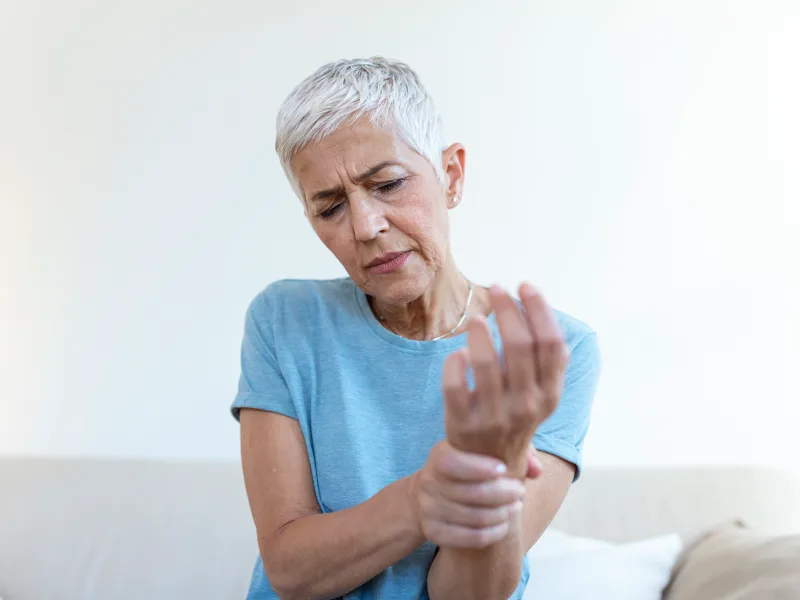Qualifying Conditions
Qualifying Conditions for Illinois Medical Cannabis Care
Illinois recognizes specific medical conditions that qualify for medical cannabis treatment. While medical marijuana may help with a wide range of health issues, only state-approved conditions are eligible. The list of qualifying conditions is subject to change as laws evolve. If you are unsure about your diagnosis or have any questions, just call us at 773-707-2060 and we can help you with your concerns.
To be eligible for a medical cannabis card in Illinois, patients must be diagnosed with a debilitating medical condition, as defined in the Compassionate Use of Medical Cannabis Pilot Program (MCCP) Act.
Illinois Debilitating Medical Conditions
You qualify for an Illinois medical marijuana card if you are at least 18 years old and are currently undergoing treatment for any chronic or debilitating medical conditions listed below.
Do you have one of the following medical conditions?

Arthritis
There are millions of people in the USA that suffer from the various forms of Arthritis, including Osteoarthritis, Rheumatoid, Gout, Psoriatic, Ankylosing Spondlyitis, or SLE (Lupas) Current research on the benefits of medical cannabis and arthritis are focused one of the main active compounds in marijuana and that is the cannabidiols. The marijuana plant’s cannabinoids have an analgesic effect that can reduce arthritis pain, have strong anti-inflammatory properties that can quickly help alleviate joint swelling and stiffness, and improved sleep quality, which often is affected by arthritis pain.

Autism
If your struggling with or life with someone affected by Autisum Spectrum disorder there are ome studies suggest that medical marijuana may help manage common behavioral symptoms in autism while promoting cognitive stability. As more time goes on there is mounting evidence to support the use of medical cannabis for Autism Spectrum Disorder.

Cancer
Medical marijuana has gained attention in oncology due to its potential to mitigate cancer-related symptoms. Cannabinoids such as tetrahydrocannabinol (THC) and cannabidiol (CBD) interact with the endocannabinoid system to modulate pain perception, inflammation, and nausea. Clinical studies suggest that cannabinoids inhibit pro-inflammatory cytokines, reduce neuropathic pain, and may influence apoptosis in tumor cells. While further research is required, cannabis remains a viable adjunct therapy for symptom management.

Chronic pain
Medical marijuana has gained recognition as a complementary therapy for cancer patients, helping to alleviate symptoms associated with the disease and its treatments. Cannabinoids, the active compounds in cannabis, interact with the body’s endocannabinoid system to reduce nausea, stimulate appetite, and manage pain. Studies suggest that tetrahydrocannabinol (THC) and cannabidiol (CBD) exhibit anti-inflammatory and analgesic properties, making them effective in reducing chemotherapy-induced nausea and chronic pain. Furthermore, some preclinical research indicates that cannabinoids may slow tumor growth and promote apoptosis in cancer cells. While ongoing research continues to explore these effects, medical marijuana remains a valuable option for symptom management in cancer patients.

Complex Regional Pain Syndrome (CRPS)
Medical marijuana may offer pain relief for CRPS by interacting with the endocannabinoid system. Limited studies suggest THC and CBD can reduce neuropathic pain and improve sleep. However, clinical evidence remains inconclusive, and professional supervision is essential to avoid interactions with other medications. More research is needed for definitive conclusions, however growing evidence and patients experience is showing medical cannabis can be very benefitial to those suffering with CRPS.

Fibromyalgia
If you’re battling fibromyalgia, medical marijuana could be the relief you’ve been searching for. With growing scientific support and patient success stories, cannabis offers a natural way to ease pain, improve sleep, and boost mood. Talk to your doctor—this might be the breakthrough that transforms your quality of life.

Irritable Bowel Syndrome (IBS)
Medical marijuana shows great promise in managing irritable bowel syndrome (IBS) by interacting with the endocannabinoid system to regulate gut function which is one area of the body the majority of these receptors are found.. Cannabinoids may reduce inflammation, pain, and spasms, helping IBS sufferers find relief. While more research is needed, early studies suggest cannabis could be a valuable tool in digestive health management.

Migraines
There’s new hope for migraine sufferers! Medical marijuana is emerging as a natural remedy to reduce headache intensity and frequency. Its anti-inflammatory and pain-relieving properties offer a gentler alternative to prescription drugs. Many patients are finally finding relief and reclaiming their lives, free from the debilitating grip of chronic migraines.

Post-Concussion Syndrome
Research suggests cannabis may alleviate post-concussion syndrome symptoms like pain, inflammation, and anxiety. THC and CBD interact with brain receptors, potentially promoting neuroprotection and healing. However, clinical data remains inconclusive, requiring further study before definitive medical recommendations can be made. Consultation with healthcare professionals is advised.

Post-Traumatic Stress Disorder
Post-Traumatic Stress Disorder (PTSD) significantly impacts mental health, causing anxiety, flashbacks, and sleep disturbances. Medical marijuana, particularly cannabinoids like THC and CBD, interacts with the endocannabinoid system to regulate stress responses. Studies suggest it may help reduce hyperarousal, improve sleep, and ease anxiety, making it a promising alternative treatment for PTSD patients.

Seizures
Research shows that cannabinoids like CBD can reduce seizure frequency by modulating brain activity and decreasing neuronal hyperexcitability. Studies support cannabis as an adjunct therapy, especially for treatment-resistant epilepsy. Further clinical trials are needed to confirm its long-term efficacy.
Additional Qualifying Conditions for Medical Marijuana in Illinois
Amyotrophic Lateral Sclerosis (ALS)
Agitation of Alzheimer’s Disease
HIV/AIDS
Anorexia nervosa
Arnold-Chiari malformation
Crohn’s disease
Dystonia
Ehlers-Danlos syndrome
Cachexia/wasting syndrome
Causalgia
Chronic inflammatory demyelinating polyneuropathy
Fibrous Dysplasia
Glaucoma
Hepatitis C
Hydrocephalus
Hydromyelia
Interstitial cystitis
Lupus
Multiple Sclerosis (MS)
Muscular Dystrophy
Myasthenia Gravis
Myoclonus
Nail-patella syndrome
Neuro-Bechet’s autoimmune disease
Neurofibromatosis
Neuropathy
Osteoarthritis
Parkinson’s disease
Polycystic kidney disease (PKD)
Reflex sympathetic dystrophy
Residual limb pain
Rheumatoid arthritis
Sjogren’s syndrome
Spinal cord disease (including but not limited to arachnoiditis)
Spinal cord injury is damage to the nervous tissue of the spinal cord with objective neurological indication of intractable spasticity
Spinocerebellar ataxia
Superior canal dehiscence syndrome
Syringomyelia
Tarlov cysts
Tourette syndrome
Traumatic brain injury
Muscular Dystrophy
Ulcerative colitis
Did You Answer Yes?
If you or a loved one are undergoing treatment for a chronic and debilitating medical condition or are currently being prescribed opioids but want an alternative natural medicine to relieve your symptoms, We will help you!
Qualifying medical conditions last updated August 15, 2019 by the Illinois Department of Public Health

What is the Opioids Alternative Pilot Program (OAPP)?
Public act 100-1114, the Alternative to Opioids Act of 2018, was signed into law on August 28, 2018; and officially launched on January 31, 2019. This law amended the Compassionate Use of Medical Cannabis Pilot Program Act and was created to battle the war against opioids by granting access to medical cannabis for qualifying patients that are currently or could be prescribed opioids by a medical provider in Illinois.
Get Your Card NowQualifications for the OAPP:
Here is what you should know:
Minimum of 21 Years old
Residency in Illinois
Certification from a licensed physician attesting that the patient is currently being prescribed opioids for their medical condition or could be prescribed opioids consistent with generally accepted standards of case.